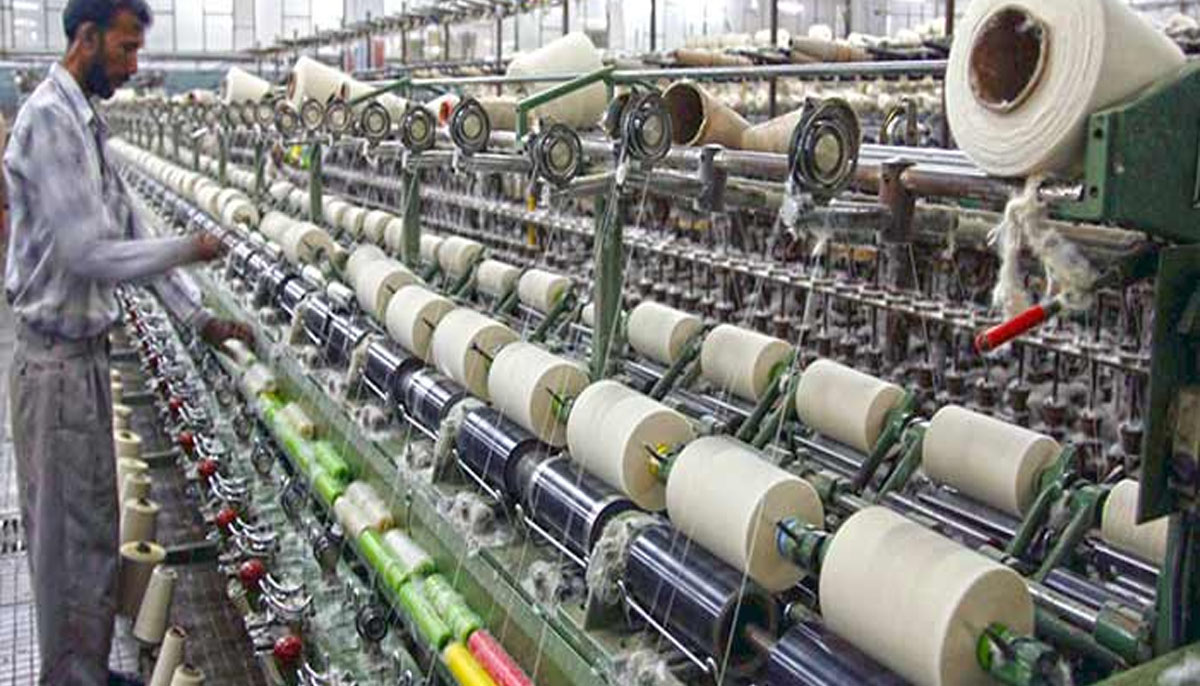What ails exports?
In the previous year’s federal budget, withdrawal of SRO 1125 and imposition of 17 percent General Sales Tax (GST) on the export oriented sectors has increased the cost of doing business to unsustainable levels as a consequence of pending refunds, liquidity squeeze and bleak industrial production and bulk of industry’s investible capital being soaked up by the sales tax refund cycle.
As the entire textile value chain gets drained of its potential capital, the industry becomes fragile and continues to operate in a state of distress. In the budget for the upcoming year, the government has completely overlooked the demands of the export sectors for restoration of zero rating.
The government sought budget proposals from all stakeholders including renowned business associations but failed to incorporate them, rejecting their proposals to make Pakistan a more hospitable place for carrying out business and investment.
Textile export sector, which is backbone of economy had it needs ignored once more. Denying the textile sectors valid concerns will eventually result in the decline of exports, closure of industries & markets and a potential tsunami of unemployment.
Abolition of the zero rating regime has only resulted in unfair treatment against local industry supplying inputs to the export oriented units while, the exporters are importing their material through different schemes i.e. DTRE, Bonds, or EOU which are exempted from 17 percent GST as domestic supply is subject to General Sales Tax which takes many months to get refunded. Surely a level playing field for domestic suppliers viz a vis imports in the face of trade deficits is essential for sustaining domestic industry.
The cardinal rule is that when you have multiple tax rates for similar goods in identical markets, the system is bound to be abused and will be gamed and crumble as a result. Instead of actively substituting domestic production with imports there is a dire need to develop and support the domestic industry. This GST implementation coupled with a major devaluation of Pakistani rupee has further aggravated the export industry's existing cash flow crisis.
Prior to July 2019, the industry had become competitive and profitable and had the zero-rating scheme continued, these funds would have been injected to upcoming new projects for upgradation and expansion of the industrial base which undoubtedly would’ve increased exports for the country.
The economic cost of the withdrawal of zero rating has been colossal. As a result of the misplaced withdrawal of Zero Rating, the entire textile industry has suffered immensely and the levy of sales tax in its present form and design has led to almost Rs. 120 billion liquidity moving from the industry to FBR. From the point of view of domestic industries, the incentive to cheat and smuggling has increased substantially.
Withdrawal of zero rating has increased the tax free imports via different schemes such as DTRE, Bonds and EOU which are detrimental to the survival of the domestic industry. Under these schemes any registered exporter can import duty and tax free imports.
Factually, no one will be willing to pay 17 percent tax on local goods and wait for an indefinite amount of time to get their refunds. This shows that withdrawal of zero rating is hurting the local industry and in time could lead to closure of local industry. Prior to withdrawal of SRO 1125, locally manufactured goods had advantage over imports because of instant availability and assurance of shorter lead times.
The GST regime has distorted the level playing field for domestic industry. The current situation of COVID-19 also suggests that we should promote our domestic industry in order to stabilise the economy and retain the employment levels.
Under current circumstances in the country due to COVID-19 and global economic recession coupled with this sales tax regime is likely to be disastrous for exports, local manufacturing and employment levels.
In the textile sector alone, over one million jobs are at stake. Demand for Pakistani products will remain between 70 to 80 percent for the foreseeable future. The price competition to retain market share will be intense and competitive pricing for Pakistani exporters are essential. It is estimated capacity of over $5 billion will remain unutilised.
This year situation has changed dramatically for the industry, as export orders have been cancelled, domestic demand has crashed due to shutdowns, payments due against LCs have been delayed, and new orders have not been issued. This is because of a complete collapse of markets and demand for textiles in Europe and USA. Circumstances are not expected to return to normalcy for quite some time and this sales tax regime is bound to induce more havoc within the country as the local manufacturing halts and employment levels plummet.
The amount of sales tax being stuck in the system is even more that the annual profits of most companies. Many companies have had to borrow from banks to finance this unjustified levy resulting in an increase in their cost of production. This, negates the government claims to move on a policy of reducing the cost of doing business in Pakistan.
The centric point of this contention of FBR was that since domestic sales constituted 50% of textile output, this was breeding grounds for tax evasion of up to a tune of $12 billion in sales. At the time, textile sector had proved that this was a false assertion and this fact has now been admitted by FBR. The FBR has now stated on record that the domestic sales of the textile sector only account for 20% of the overall value of textile production of the country.
Sales Tax refunds are not forthcoming as per the promised and unequivocally stated claims that payments would be paid within 72 hours of filing of H forms. This has not happened and the sales tax claims even after filing of H forms have remained unpaid for months on end. In fact, the flow of quantum of refunds was very tightly regulated by the Ministry of Finance/FBR and processing of payments limited to the quantum/value predetermined by the Ministry of Finance. The Sales Tax returns/H forms were routinely deferred or rejected by FBR on artificial limits established by them which had no basis in reality of the industry. In other words, nothing had changed from previous years in terms of refund processing.
The government had at the time of withdrawal of SRO 1125 assured the industry that it would review the situation in 6-8 months’ time. More than a year has now passed, and it is evident that the Sales Tax system is not contributing significantly to the FBR kitty. On the other hand, the government, FBR and the entire industry is constantly holding meetings and wasting money and time on resolving the issue of refunds.
Implementation of 17 percent GST for industry which is uneven has resulted in higher costs for exports. It would be difficult for small and medium sized exporters to survive under the current circumstances. Indirect exporters cannot recover the input tax used in manufacturing process because there is no refund till the final export. Another issue is segregation of input taxes and any system which needs apportionment would lead to serious impediments.
It is not possible to expect the value chain to keep on paying Sales Tax with little chance of obtaining their refunds in a timely and agreed manner from FBR. This delay results in affecting the entire supply chain as the exporters delay payments to their suppliers who in turn are forced to delay down the line. This has resulted in severe cash flow problems in part owing to the banks reluctance to finance these payments.
Should government still wish to collect sales tax on domestic sales, from a market that is already in dire straits, then it should collect the sales tax at the Point of Sale. The point of taxation must be the point of sales, whereas rate of sales tax on local supplies of finished articles of textile and finished fabric raised from 6 per cent to 15 percent for integrated business and 9 percent to 17 percent for others. Further 3 percent tax chargeable on all supplies made to an unregistered person under section 3 (1A0 of the Sales Tax Act, 1990).
In the foreseeable future the continuation of the sales tax regime applicable to an industry with 80% exports is counterproductive and will make recovery of exports to any significant level post-COVID very difficult and even make it impossible.
To achieve the targeted exports, business-friendly policies should be ensured for the industry to grow and further achieve enhanced targets. Our industry is currently not equipped to achieve significant target within a shorter period since there are numerous time-consuming issues including the development of infrastructure, etc. to become a true player in the world market. However, there is a will and potential in the textile industry to play for the economic turnaround and achieve the targets if it is incentivised properly.
Under these circumstances it is pertinent to immediately restore the SRO 1125 i.e. zero rating for the textile supply chain or reduce tax to 5 percent across the value chain. Capturing organised retail sector worth $12 billion is only possible if lower sales tax is applied across the value chain. As lower tax rate will garner higher revenues as greater volumes will be subject to a lower sales tax rate. Furthermore, incentive to cheat or smuggle will also be discouraged. As a result, domestic market will be documented and largely “Made in Pakistan”.
It is high time for government to re-evaluate its economic direction in order to move forward on the path of economic development & growth by encouraging businesses. On contrary if the government decides to remain indifferent to the needs of the industry, it will only result in de-industrialisation, huge liquidity crisis, a precipitous fall in exports and unemployment.
-
 'Bridgerton' Season 4: Showrunner Talks About Violet's Steamy Romance
'Bridgerton' Season 4: Showrunner Talks About Violet's Steamy Romance -
 John Tesh Recalls ‘uncomfortable’ Backlash Over ’70s Romance With Oprah Winfrey
John Tesh Recalls ‘uncomfortable’ Backlash Over ’70s Romance With Oprah Winfrey -
 Meghan Markle, Prince Harry Problem Was Not ‘work’ During Time With Royals
Meghan Markle, Prince Harry Problem Was Not ‘work’ During Time With Royals -
 Meta Strikes Multi-billion-dollar AI Chip Deal With Google: Will The New Collaboration Pay Off?
Meta Strikes Multi-billion-dollar AI Chip Deal With Google: Will The New Collaboration Pay Off? -
 Gracie Abrams Breaks Silence After Losing 2026 BRIT Award
Gracie Abrams Breaks Silence After Losing 2026 BRIT Award -
 Deon Cole Takes Swipe At Nicki Minaj In Mock Prayer During NAACP Image Awards Monologue
Deon Cole Takes Swipe At Nicki Minaj In Mock Prayer During NAACP Image Awards Monologue -
 Jennifer Garner Reveals The Actress Who 'carried Through Things'
Jennifer Garner Reveals The Actress Who 'carried Through Things' -
 Shamed Andrew ‘awful’ Time As Trade Envoy Is Laid Bare By Insider
Shamed Andrew ‘awful’ Time As Trade Envoy Is Laid Bare By Insider -
 Belgium Seizes Suspected Russian Shadow Fleet Tanker
Belgium Seizes Suspected Russian Shadow Fleet Tanker -
 Liza Minelli Makes Bombshell Claim About Late Mother Judy Garland’s Struggle With Drugs
Liza Minelli Makes Bombshell Claim About Late Mother Judy Garland’s Struggle With Drugs -
 Shipping Giant Maersk Halts Suez Canal, Bab El-Mandeb Sailings Amid Escalating Conflict
Shipping Giant Maersk Halts Suez Canal, Bab El-Mandeb Sailings Amid Escalating Conflict -
 Matthew McCoughaney Reveals One 'gift' He Achieved With Losing Nearly 50 Pounds
Matthew McCoughaney Reveals One 'gift' He Achieved With Losing Nearly 50 Pounds -
 'Scream 7' Breaks Box Office Record Of Slasher Franchise: 'We Are Grateful'
'Scream 7' Breaks Box Office Record Of Slasher Franchise: 'We Are Grateful' -
 Bolivian Military Plane Crash Death Toll Rises To 20
Bolivian Military Plane Crash Death Toll Rises To 20 -
 'Sinners' Star Blasts Major Media Company For 2026 BAFTAs Incident
'Sinners' Star Blasts Major Media Company For 2026 BAFTAs Incident -
 Inside Scooter Braun, Sydney Sweeney's Plans To Settle Down, Have A Baby
Inside Scooter Braun, Sydney Sweeney's Plans To Settle Down, Have A Baby




